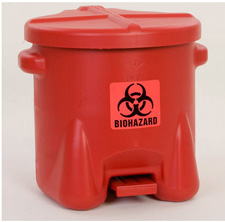| The Home page of ILPI's Safety Data Sheet (SDS) Resource, the leader in SDS information since 1995! | |
| The history and philosophy behind this resource. | |
| A curated collection of books and reference materials concerning Safety Data Sheets and closely related topics. | |
| Paste your plain text SDS into the SDS-Demystifier, and it will be converted into a hypertext-enriched document with links to detailed explanations of each key term. | |
| An extensive list of frequently asked questions about Safety Data Sheets including regulations, content, compliance, and more. | |
| A humorous take on Safety Data Sheet jargon. Fill in the blanks on our entry form to generate a personalized Unsafety Data Sheet to share with your coworkers. | |
| Since 1995, we've maintained this massive curated list of the best places to find Safety Data Sheets on the Internet. | |
| You are here! Way more than a glossary, this hypertext-enhanced resource covers hundreds of SDS-related terms and expert knowledge. Each entry includes both the SDS relevance and links to additional authoritative resources. | |
| Archived results of Safety Data Sheet related polls taken by some of our millions of site visitors | |
| The OSHA regulations behind SDS regulations, including the inspection guidelines and over 400 official interpretations letters under the Hazard Communication Standard | |
| Commercial suppliers of SDS authoring and management software as well as cloud compliance services. | |
| Commercial companies that will create SDS's for your specific needs as well as SDS translation companies. |

Safety signs, banners, and scoreboards? Get yours at Safety Emporium!

Safety Emporium carries biohazardous waste cans, labels, training materials and more...
Definition
Hematuria is a fancy medical term for "blood in the urine".
Additional Info
Hematuria falls into two general classes:
- Gross hematuria means that the blood can be seen in the urine with the naked eye. This condition is usually the result of internal bleeding, usually from the kidneys or bladder. Possible causes include accident, trauma or disease. Seek medical attention immediately.
- Microscopic hematuria is a degree of bleeding so low that the blood can not be seen with the naked eye. Possible causes include kidney or bladder disease or damage. This condition can be detected through laboratory tests.
SDS Relevance
Finding blood in your urine is not normal. Seek medical attention if you suspect you have blood in your urine.
Exposure to certain chemicals can cause hematuria. One example is acetic acid.
When this term is found on Safety Data Sheets it is usually in Section 11 (toxicological information) as a symptom of exposure. Other sections of the SDS should explain how you can take appropriate precautions to reduce your risk of exposure.
Further Reading

Bring it all together with laboratory lattice frames and connectors from Safety Emporium.
- Isolated Hematuria At the Merck Manual Professional version.
- Blood in Urine At the Merck Manual Consumer version.
- Blood in the Urine (Hematuria) Causes, Pain, and Treatment in Men and Women at MedicineNet.
- Blood in urine (hematuria) at the Mayo Clinic.
- Hematuria (Blood in the Urine) at the NIH's National Institute of Diabetes and Digestive and Kidney Diseases.
- Hematuria at Harvard Health Publishing.
- Microscopic Hematuria at FamilyDoctor.org.
- Assessment of Microscopic Hematuria in Adults from Am Fam Physician 2006, 73(10), 1748-1754.
- Hematuria at the Urology Care Foundation.
See also: nephrotoxin.